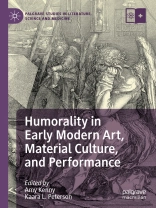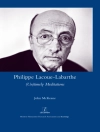Humorality in Early Modern Art, Material Culture, and Performance seeks to address the representation of the humors from non-traditional, abstract, and materialist perspectives, considering the humorality of everyday objects, activities, and performance within the early modern period. To uncover how humoralism shapes textual, material, and aesthetic encounters for contemporary subjects in a broader sense than previous studies have pursued, the project brings together three principal areas of investigation: how the humoral body was evoked and embodied within the space of the early modern stage; how the materiality of an object can be understood as constructed within humoral discourse; and how individuals’ activities and pursuits can connote specific practices informed by humoralism. Across the book, contributors explore how diverse media and cultural practices are informed by humoralism. As a whole, the collection investigates alternative humoralities in order to illuminate both early modern works of art as well as the cultural moments of their production.
表中的内容
Introduction.- Part I: Performing the Humoral Body.- Like Furnace: Sighing on the Shakespearean Stage, Darryl Chalk (University of Southern Queensland).- Performing Pain, Michael Schoenfeldt (University of Michigan).- Humoral Style(s), Robert Stagg (University of Oxford).- A ‘dummy corpse full of bones and entrails’: Staging Severed Heads in the Early Modern Playhouse, Amy Kenny (University of California, Riverside).- Part II: The Humorality of Objects. ‘Having no heart’: the Humorality of Toys and Games, Ariane M. Balizet (Texas Christian University).- The Virgin Queen’s Mettle: Metallic/Medallic Portraits of Elizabeth I, Kaara L. Peterson (Miami University).- Passions, Fruits, and Botanical Paintings, Amy L. Tigner (University of Texas, Arlington).- Part III: Humoral Pursuits.- . Seeing Saints in the Forest of Arden: Melancholic Vision in As You Like It” Kimberly Rhodes (Drew University).- A Familist Portrait: Negotiating Classical Geohumoral Discourse in the
Theatrum Orbis Terrarum, Paul Babin (Northeastern University).- ‘Great Annyoyance to Their Mindes:’ the Humors, Intoxication, and Addiction in English Medical and Moral Discourses, 1550 to 1830, David Clemis (Mount Royal University).- Afterword, Gail Kern Paster (Director Emerita, Folger Shakespeare Library).
关于作者
Amy Kenny teaches at University of California, Riverside, USA, and has a Ph D in early modern literature and culture. Her first monograph, entitled Humoral Wombs on the Shakespearean Stage (Palgrave Macmillan), was published in 2019.
Kaara L. Peterson is Associate Professor of English at Miami University of Ohio, USA. Her books include
Popular Medicine, Hysterical Disease, and Social Controversy in Shakespeare’s England (2010) and, with Deanne Williams,
The Afterlife of Opheila (Palgrave Macmillan 2012).












